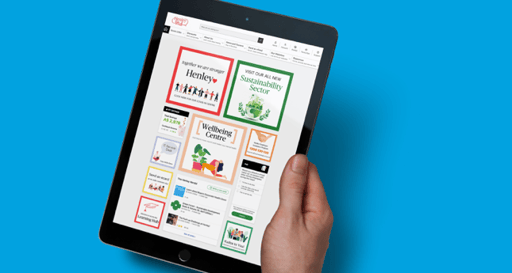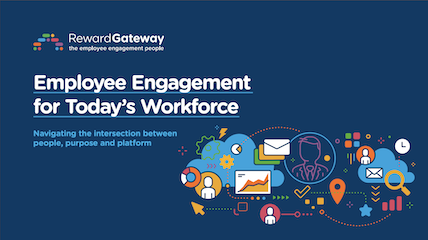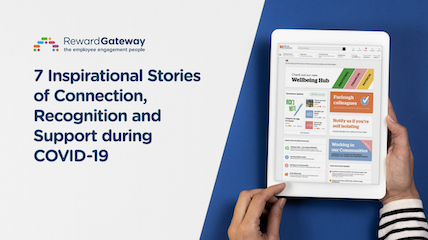See how to navigate this new landscape and get the most out of your business and your people.
Learn more »

Having a dedicated focus on employee engagement has never been more important. We know that companies with engaged employees outperform those without by 202%, and that highly engaged businesses benefit from a 10% increase in customer ratings and a 20% increase in sales. Engagement is more than ping pong tables and free lunches.
It is about creating an environment and a culture where engaged employees thrive.
An engaged employee is someone who understands and believes in the direction the organization is going. They understand how their role affects and contributes to the organization's purpose, mission and objectives. And lastly, they genuinely want the organization to succeed, and feels shared success with the organization.

|
|
2. Engaged employees are more productive because they like or love what they are doing. |
|
And it is the company that has that type of workforce that will not only survive, but thrive into the future.

Schedule a demo to discover tools to help you succeed in a new era of employee engagement
Schedule a Demo »This has become all the more apparent as employees have turned to their leaders to connect, support and recognize them in the changing world of the COVID-19 pandemic. Throughout the pandemic, employee trust has changed – with statistics at the height of the pandemic in April noting only 32% of U.S. employees saying their organization had trusted leaders and managers to navigate the crisis, rising to 51% of employees believing their employer is well-prepared just a month later.
In June, Gallup reported only 31% of employees were engaged, and since then with recent events this number has skyrocketed to 40%. As we emerge from COVID-19, employee engagement will play a critical role in how employers recover, and how employees respond to their new working environments.
Employees have to feel connected to their company's overall mission, purpose and values, realizing how their contributions can impact the recovery and growth of the organization. In the face of adversity, employees will only continue to give their best for businesses they feel connected and supported by.
And, given the pandemic-related financial stress many companies are experiencing, employers have to do more, with less. HR has never juggled so many hats –improving the employee experience, streamlining processes to positively impact budget and exploring new ways to connect leaders and employees, putting in strategies to increase productivity, just to name a few. But while the COVID-19 pandemic may have elevated HR to be the shining star of the business, the post-COVID-19 employee engagement era offers an opportunity for HR to be the hero their business will continually rely on to survive and thrive.
Businesses that come out the other side of the COVID-19 pandemic will see their post-COVID-19 employee engagement strategy evolve to one that:

The new era of post-COVID-19 employee engagement has to be one that is inclusive, personalized and, above all human. When employees were unsure where to turn, what resources were available to them or if they were waking up to losing their job, HR stepped in to be the partner that businesses needed, and that their people craved.
Businesses that continue to put their people first and show employees that they care through meaningful recognition, open and honest communications and inclusive wellbeing will be the ones that employees want to be a part of.
Leaders can do this by creating channels for open and honest conversation and feedback to let employees offer their voice and positively influence cultural transformation. Reaching your entire workforce demographic means putting in place initiatives that allow for a myriad of voices to influence your entire business.

Budget constraints and a changing workplace environment require new ways of working, including how to do more with less – less budget, fewer people and less time. So how can HR partner with their business to best connect, recognize and support their people, without hampering potential business growth? The businesses that work within these constraints to continually innovate will surge ahead of their competition, which means understanding how to find dual and multi-purpose solutions to business challenges.
A tick-the-box solution that only serves one purpose isn’t going to move the needle on engagement strategy, and certainly won’t benefit the budget constraints many businesses are finding themselves in. HR leaders should look for new ideas to maximize time and get the best ROI they can out of what they can offer to their people.

Engaged employees are essential to business growth. We know this. But in a post-COVID-19 world, engaged employees are what businesses need to truly transform themselves to get on the path to success. To get there, businesses must take an agile approach to their employee engagement strategy and be willing to accept that their first plan might not be their only plan, and needs to be agile to fulfill the changing needs of their business and their people.
If anything, the COVID-19 pandemic taught HR leaders not to be as scared of the unknown as we once were – that with the right tools and teams in place, businesses can withstand even the toughest of times.
The ones that will stand the test of time are the ones that can pivot quickly to put in place successful initiatives.
Your employee engagement strategy has the opportunity to transform your business, and your culture, to one that employees will be proud to work their hardest for.

See how to navigate this new landscape and get the most out of your business and your people.
Learn more »
Discover new ways of connecting, recognizing and supporting employees during COVID-19 with real-life tales from a variety of industries.
Learn more ».png)
Learn how innovative communications and recognition sparked engagement in a predominantly offline workforce.
Learn more »
Neil Lott, CEO
Pacific Atlantic Handling
Reward Gateway Integrations
Open API | Yapster | Amazon | MS Teams | Slack | All Integrations
Topics
Employee Reward and Recognition Program | Employee Incentive Program | Employee Experience Platform | Social Recognition | Corporate Rewards | Internal Communications App
Copyright © 2024. Cookie Policy | Privacy Notice | Site Map